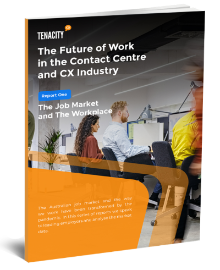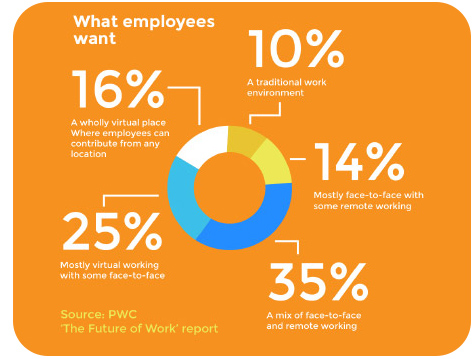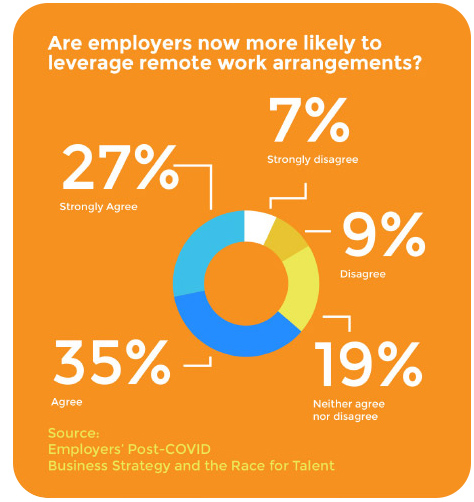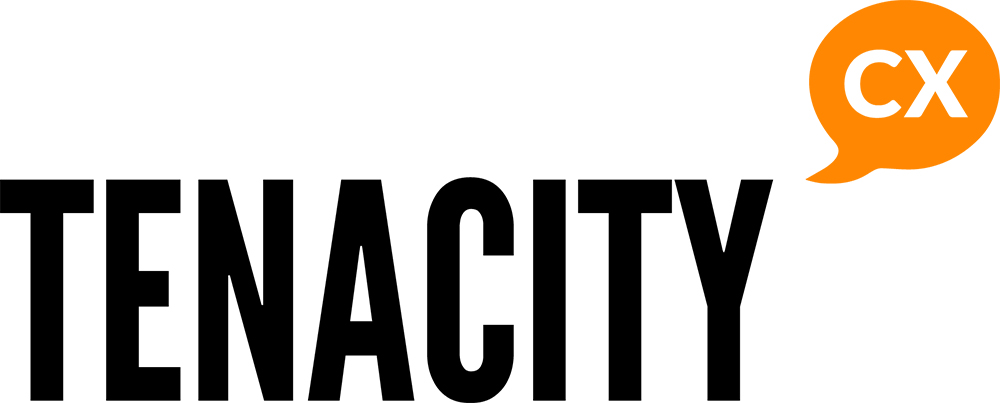With Elon Musk insisting all his staff must go back to the office or ‘pretend to work elsewhere’ the debate about where knowledge workers should work from, post-pandemic, rages on.
While office occupancy rates in Australia’s capital cities are slowly creeping back up, the majority of employees still prefer working from home.
And looking at the number of remote working jobs that we’re being asked to recruit for it seems plenty of employers are happy to accommodate them.
A recent SEEK survey found that 95% of people want at least one day per week of remote working, while more than 60% of employers currently offer hybrid working in some form.
Free Report
Download our free report "The Future of Work in the Contact Centre & CX Industry" for a deeper dive into flexible working and other issues facing the Australian labour market.
Employee attitudes to flexible working
According to a survey by Slack only 30% of knowledge workers are going into the office full time. In our experience it’s more like 10%. The same Slack survey found that 58% of workers have some sort of flexible working deal in place, and this figure is rising all the time.
There have been quite a few other surveys recently asking employees what they want:
- 78% want location flexibility (up from 76% last quarter) - Slack
- 95% want schedule flexibility (up from 93%) – Slack
- Only 10% of Australian workers want to go back to the office full time – PwC
- 72% of workers want a combination of working from home and working in the office. Source: PwC’s Hopes and Fears Survey 2021.
- 33% of workers would not accept a new role that did not offer remote working. Source: PwC’s US Next in work survey 2021.
- In another survey 65% want to remain fully remote while 31% prefer hybrid - Flexjobs
 When PwC asked Australian employees what their ideal future of work would look like, almost three quarters want some form of flexible working.
When PwC asked Australian employees what their ideal future of work would look like, almost three quarters want some form of flexible working.
The reasons for these preferences include better work-life balance, reduced anxiety, and wanting a better sense of belonging.
It’s not just about wages and flexibility. Workers also want to feel that what they do matters. They want to be connected to purpose.
As customers become more and more comfortable using digital channels – a move that the pandemic escalated – paradoxically the role of the contact centre agent is getting more complex.
With automation and self-service taking care of most routine and simple enquiries, agents are left to deal with only the thorniest interactions.
For the last 30 years contact centres have effectively been data centres anyway. Contact centre agents are the most reported on and analysed workers on the planet. Machines have less analytical diligence done on them. It’s amazing they haven’t gone home earlier given the amount of data we have on their performance. We even have measures of whether they’re agreeable or gruff from call sentiment data. I think we’ll move to hybrid long-term as there’s no barrier to it.
Head of Member Services at a major insurance company
Employer attitudes to flexible working
 While many employers are positive about flexible working, citing a range of benefits including cost savings and a wider talent pool to draw from, plenty have concerns. Those centre around productivity and loss of control, the difficulty of embedding culture and engagement with remote workers, and the reduction in opportunities for collaboration and innovation.
While many employers are positive about flexible working, citing a range of benefits including cost savings and a wider talent pool to draw from, plenty have concerns. Those centre around productivity and loss of control, the difficulty of embedding culture and engagement with remote workers, and the reduction in opportunities for collaboration and innovation.
The Employers’ Post-COVID Business Strategy and the Race for Talent report found that 62% of executives surveyed reported that, after being forced to experiment with home working, they are “now more likely to leverage remote work arrangements to strategically expand our talent pool.”
The reason contact centre staff didn’t widely work from home, prior to the pandemic, was predominantly down to trust issues. When given no other option, managers pulled the trigger on home working and largely it’s been a huge success.
When asked if the shift to remote working was permanent 50% of respondents agreed. In addition, 46% agreed that their organisation had become more productive with the shift to remote working.
While there are certainly issues around engagement and collaboration, most of the leaders we spoke to see them as barriers which can be overcome, with a little thought and planning, just like issues around security and productivity were mostly overcome during the pandemic.
A recent Harvard Business Review says this is a “once-in-a-lifetime opportunity to reset work using a hybrid model—one that, if we can get it right, will allow us to make our work lives more purposeful, productive, agile, and flexible.”
The pandemic has changed the face of how we work forever. We are typically conservative in how we change our operations. But with so many organisations with massive workforces all working from home, it’s opened up a whole world of possibility. Our people certainly appreciate the flexibility. We can see exciting new possibilities around recruitment as we’re no longer stuck in a geographical market. We can look further afield, even for senior roles.
Head of Call Centre Operations at a large health insurance company
Take aways
- The nature of work is changing, as are employees’ expectations of what it means to have a job.
- The quid pro quo employees have with their employers isn’t what it was due to stagnant wages and the rising costs of living and housing.
- Employees have had a taste of freedom with remote working and they want to keep it for a better work-life balance.
- Talent shortage for contact centre agents means employers are competing harder than ever for staff.
- Embracing flexible working along with digital and cloud is the way to build out your contact centre of the future.
In fact, it’s likely the next contact centre won’t be a centre at all, but instead a distributed network of agents and technologies that can deliver service from anywhere in the world while at the same time serving customers through whatever channels they prefer – whenever and wherever they want to be served.
Deloitte, The Contact Centre of 2030 can't wait, it's now....
Free Report
Download our free report "The Future of Work in the Contact Centre & CX Industry" for a deeper dive into flexible working and other issues facing the Australian labour market.


